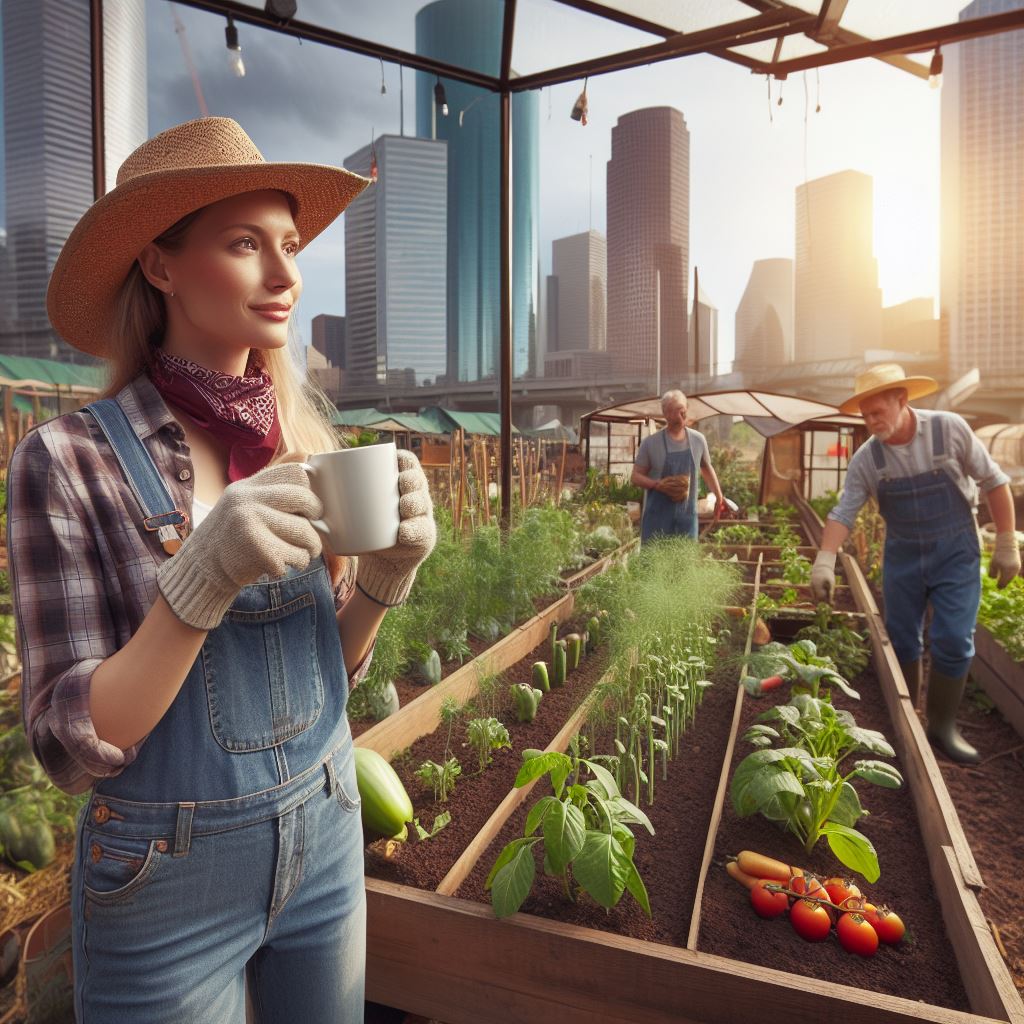Introduction
Portland urban farm pioneers, Portland’s Pioneers are paving the way for innovation in urban farming, transforming their community one harvest at a time.
Urban farming has become increasingly important, offering numerous benefits to communities.
By cultivating crops and raising livestock in urban areas, these pioneers are revolutionizing the concept of agriculture.
Through their innovative practices, they are not only providing fresh produce for their community but also fostering sustainability and addressing food security concerns.
Urban farming has a significant impact on communities.
Firstly, it promotes self-sufficiency by enabling individuals to grow their own food, reducing their dependence on industrialized agriculture.
This empowers individuals, giving them control over what they consume and allowing them to prioritize organic and locally sourced produce.
Additionally, urban farming plays a vital role in building stronger communities.
These farms serve as hubs for social activities where neighbors can come together, exchange knowledge, and share experiences.
They foster a sense of belonging and build strong relationships among community members.
Furthermore, urban farming has a positive impact on the environment.
By utilizing vacant land and rooftops, these pioneers are transforming neglected spaces into flourishing areas of greenery.
This not only helps mitigate the effects of urbanization but also improves air quality and reduces the heat island effect.
In summary, the pioneers of Portland’s innovative urban farm are at the forefront of urban farming, redefining the relationship between communities and food production.
Their dedication to sustainability, self-sufficiency, and community-building demonstrates the immense value of urban farming.
By embracing this practice, we can create healthier and more resilient communities for future generations.
Background of Portland’s Pioneers
Portland’s Pioneers are a group of passionate individuals dedicated to revolutionizing urban farming in the city.
They have a diverse background, ranging from environmentalists to entrepreneurs, united by their love for sustainability and community empowerment.
These pioneers have taken on the challenge of transforming vacant urban spaces into thriving farms.
Vision and Commitment to Sustainability and Community Empowerment
The pioneers in Portland had a clear vision from the beginning – to create a sustainable and inclusive urban farming community.
They believed that by harnessing the potential of unused urban spaces, they could create a positive impact on the environment while providing fresh and locally grown produce to the community.
Their commitment to sustainability goes beyond just growing food.
They use organic farming techniques, minimize water and energy consumption, and prioritize waste reduction and recycling.
Their aim is to create a closed-loop system that minimizes the ecological footprint of urban farming.
Community empowerment is another core aspect of their mission.
They believe that everyone should have equal access to nutritious food, regardless of their financial situation.
They actively engage with local schools, community centers, and residents to educate and inspire them to grow their own food, fostering a deeper connection between people and their food sources.
Previous Projects and Initiatives
Portland’s Pioneers have been involved in several noteworthy projects and initiatives over the years.
One of their major projects was the transformation of a vacant lot into a vertical farm, utilizing recycled materials and innovative hydroponic systems.
This project not only provided fresh produce but also created green jobs for the local community.
Another initiative they took was to convert rooftops of buildings into urban gardens.
By partnering with building owners and working with local businesses, they utilized underutilized urban spaces to grow crops and herbs, reducing the carbon footprint associated with transportation of food.
They also launched an educational program in collaboration with local schools, where students were taught about sustainable farming practices and given the opportunity to grow their own food.
This initiative not only instilled a sense of responsibility towards the environment but also encouraged healthy eating habits among the younger generation.
Portland’s Pioneers have truly revolutionized urban farming in the city.
Their vision, commitment to sustainability, and community empowerment have paved the way for a more resilient and eco-friendly food system.
Through their innovative projects and initiatives, they have not only provided access to fresh and locally grown produce but also inspired a sense of ownership and connection within the community.
By transforming unused urban spaces into thriving farms, Portland’s Pioneers have shown that with dedication and creativity, any vacant lot or rooftop can become a source of nutritious food and community empowerment.
Their legacy will continue to inspire future generations to embrace urban farming and work towards a more sustainable and inclusive future.
Transform Your Agribusiness
Unlock your farm's potential with expert advice tailored to your needs. Get actionable steps that drive real results.
Get StartedRead: Fencing Fields: A Sheep Farmer Diary
The Urban Farm
Portland’s Pioneers have created an innovative urban farm that is revolutionizing agriculture in the city.
Description of the Farm
The urban farm, designed by Portland’s Pioneers, is a vibrant and sustainable oasis in the heart of the city.
It serves as a model for urban farming and showcases the potential for sustainable food production in densely populated areas.
Location and Size
The farm is strategically located on a previously vacant lot in downtown Portland.
It occupies an impressive area of 2 acres, making it one of the largest urban farms in the region.
Variety of Crops and Animals
This pioneering farm boasts an extensive variety of crops, including organic vegetables, fruits, herbs, and even flowers.
The farmers have also integrated livestock into the farm, raising chickens, goats, and honeybees.
Unique Features and Techniques
The design and operations of this urban farm incorporate several unique features and techniques, setting it apart from traditional farms:
- Vertical Farming: To maximize space, the farm utilizes vertical farming techniques, cultivating crops on multi-tiered structures.
- Hydroponics: A significant portion of the crops are grown hydroponically, using nutrient-rich water instead of soil, leading to higher yields and efficient water usage.
- Roof Gardens: To fully utilize the available space, the farm features innovative roof gardens, where plants thrive under the careful tending of experienced farmers.
- Solar Panels and Rainwater Harvesting: The farm extensively employs sustainable technologies such as solar panels for powering irrigation systems and rainwater harvesting for watering the crops.
- Composting and Natural Fertilizers: Portland’s Pioneers have prioritized sustainability by implementing a comprehensive composting system to recycle organic waste and create natural fertilizers.
This urban farm not only produces nutritious and locally grown food but also serves as an educational hub for the community, offering workshops and classes on sustainable farming practices.
Furthermore, the farm collaborates with local restaurants and markets to supply fresh produce, creating a direct farm-to-table system that supports the local economy and reduces the carbon footprint associated with transportation and distribution.
In short, Portland’s Pioneers have truly revolutionized urban farming through their innovative farm design and sustainable practices.
This urban farm is a testament to the potential for turning unused urban spaces into productive agricultural areas, providing fresh and healthy food for the community and inspiring others to follow in their pioneering footsteps.
Read: Sowing Hope: Farming in Changing Climes
Community Engagement
Portland’s Pioneers engage with the local community
Portland’s Pioneers have taken community engagement to new heights by actively involving locals in their urban farm.
Through a wide range of educational programs and workshops, they empower community members to learn and take part in sustainable farming practices.
Educational programs or workshops they offer
Their educational programs are designed for individuals of all ages, from young school children to adults with a passion for gardening.
Through these programs, locals are taught about the importance of organic farming and are provided with practical skills to implement in their own gardens.
Workshops on topics such as composting, seed saving, and permaculture are regularly held to ensure that community members have access to a wealth of knowledge.
Efforts to involve community members in the farm’s operations and decision
Moreover, Portland’s Pioneers understand the value of hands-on learning.
They offer opportunities for locals to actively participate in the farm’s daily operations.
By involving community members in planting, harvesting, and maintaining the crops, they instill a sense of ownership and connection to the farm.
This involvement not only promotes a sense of community but also allows individuals to experience the joys and challenges of sustainable farming firsthand.
Making processes
In addition to physical involvement, Portland’s Pioneers also prioritize community members’ voices in decision-making processes.
Regular meetings are held where locals are given the opportunity to voice their opinions and suggestions regarding the farm’s operations.
This ensures that the farm is shaped by the needs and desires of the community it serves.
To further encourage community engagement, Portland’s Pioneers organize events and celebrations on the farm.
These events provide an opportunity for locals to gather, celebrate, and connect with one another.
Farm-to-table dinners and summer festivals are just a few examples of the exciting gatherings that take place throughout the year.
Community involvement is also extended beyond the farm’s borders.
Portland’s Pioneers actively collaborate with other community organizations and schools to spread their knowledge and promote sustainable farming practices city-wide.
By creating partnerships, they are able to reach a wider audience and make a greater impact on the community as a whole.
The efforts of Portland’s Pioneers to engage with the local community have not gone unnoticed.
The urban farm has become a gathering place where individuals from all walks of life come together to learn, share, and grow.
The sense of community fostered by the farm has strengthened neighborhood bonds and created a space for dialogue and collaboration.
In fact, Portland’s Pioneers have demonstrated a deep commitment to community engagement.
Through their educational programs, involvement in decision-making processes, and collaboration with other organizations, they have successfully created an inclusive and sustainable farming community.
The impact of their efforts extends far beyond the boundaries of the farm, enriching the lives of individuals and making Portland a greener and more connected city.
Read: Tractor Tracks: Innovations in Farming

Sustainable Practices
Portland’s Pioneers are leading the way in innovative and eco-friendly urban farming practices.
Their commitment to sustainability is evident in the various initiatives they have implemented on their farm.
Use of Organic Fertilizers and Pesticides
One of the key sustainable practices embraced by Portland’s Pioneers is the use of organic fertilizers and pesticides.
They believe in promoting healthy and chemical-free farming methods, making their produce safe for consumption and the environment.
By avoiding harmful chemical inputs, they strive to maintain soil fertility and minimize any negative impacts on surrounding ecosystems.
Organic fertilizers, such as compost made from food waste and other organic materials, are an essential component of their farming practices.
The Pioneers understand the importance of utilizing natural nutrient sources to enrich the soil and promote healthy plant growth.
This approach not only avoids the pollution and environmental degradation associated with synthetic fertilizers but also supports the overall sustainability of their farming operations.
Similarly, the Pioneers focus on using organic pesticides derived from natural sources and practices integrated pest management.
This method involves monitoring pests and using biological controls to minimize their impact on crops, rather than relying on harmful chemical sprays.
By adopting this approach, they ensure that their produce is free from harmful pesticide residues, protecting both consumer health and the environment.
Utilization of Renewable Energy Sources
Another sustainable practice implemented by Portland’s Pioneers is the incorporation of renewable energy sources into their farming operations.
They have installed solar panels and wind turbines to harness clean energy, reducing their dependence on non-renewable sources and minimizing their carbon footprint.
Showcase Your Farming Business
Publish your professional farming services profile on our blog for a one-time fee of $200 and reach a dedicated audience of farmers and agribusiness owners.
Publish Your ProfileThe use of solar panels allows the Pioneers to generate electricity to power various farm operations, including irrigation systems, climate control, and lighting.
By utilizing this clean and abundant energy source, they not only reduce their reliance on fossil fuels but also contribute to the overall reduction of greenhouse gas emissions.
In addition to solar power, the Pioneers have also installed wind turbines on their farm.
These turbines harness the power of the wind to generate electricity, providing another sustainable energy source.
The combination of solar and wind energy ensures a reliable and consistent supply of clean energy, ensuring the farm’s operations are environmentally-friendly.
Water Conservation and Waste Management Strategies
Water conservation is a crucial aspect of sustainability in farming, and Portland’s Pioneers excel in this area.
They have implemented various strategies to minimize water usage and ensure efficient irrigation practices.
The Pioneers have installed modern irrigation systems that utilize advanced technology to optimize water usage.
These systems are designed to provide plants with the right amount of water at the right time while reducing waste.
By using drip irrigation and precision watering techniques, they minimize water evaporation and target the root zones of plants, maximizing water efficiency.
Furthermore, the Pioneers have implemented rainwater harvesting systems to collect and store rainwater for irrigation purposes.
This practice allows them to rely less on freshwater sources and make effective use of natural precipitation.
By capturing and using rainwater, they conserve water resources and reduce the strain on local water supplies.
In terms of waste management, the Pioneers adhere to strict recycling and composting practices.
They ensure that all farm waste, such as organic plant matter and food scraps, is properly composted to create nutrient-rich soil amendments.
This closed-loop system minimizes waste disposal and contributes to the overall health of the farm’s ecosystem.
Overall, Portland’s Pioneers have set a high standard for sustainable farming practices.
Through their organic approach, utilization of renewable energy, and efficient water conservation strategies, they demonstrate the possibilities of creating an environmentally-friendly urban farm.
By prioritizing sustainability, they are not only producing high-quality, safe food but also inspiring others to adopt similar practices for a greener future.
Read: Tilling Tales: A Family Farm History
Challenges and Solutions
In the section titled “Challenges and Solutions,” we will explore the difficulties faced by Portland’s Pioneers in maintaining and expanding their urban farm.
We will also discuss the innovative solutions they have implemented to overcome these challenges and their partnerships with local organizations or businesses to ensure sustainability.
- Limited Space: Pioneers tackled space constraints by implementing vertical gardening techniques, growing crops upwards on trellises.
- Soil Quality: They enriched soil quality using raised bed gardening, incorporating compost and organic matter.
- Water Availability: Pioneers installed rainwater harvesting systems and practiced drip irrigation for efficient water use.
- Pests and Diseases: They utilized natural pest control methods like companion planting and crop rotation.
- Lack of Community Support: Pioneers engaged with residents through educational workshops, fostering community involvement.
- Collaboration with Local Organizations: They partnered with a gardening center for expertise and resources.
- Relationship with Local Businesses: Pioneers secured contracts with restaurants and stores for produce sales.
- Engaging Volunteers: They developed a volunteer program for community involvement in farming activities.
- Continuous Learning: Pioneers attended workshops and conferences to stay updated with urban farming techniques.
- Advocacy and Policy Change: They advocated for supportive policies through engagement with local government officials.
In general, Portland’s Pioneers have faced numerous challenges in maintaining and expanding their urban farm.
However, their innovative solutions, partnerships with local organizations and businesses, and community engagement have enabled them to overcome these obstacles.
With their relentless pursuit of sustainable farming practices, they serve as a model for urban farming initiatives worldwide.
Impact on the Community
- Portland’s Pioneers’ urban farm positively impacts the community by providing fresh produce and fostering engagement.
- Access to locally-grown food reduces food deserts and improves residents’ health.
- Community events and workshops promote unity, education, and empowerment.
- The farm serves as an educational resource, offering school tours and workshops for students.
- Employment opportunities contribute to local economic growth and neighborhood revitalization.
- The farm inspires similar projects, serving as a model for sustainable urban farming.
- Organic farming methods minimize environmental impact and enhance biodiversity.
- The farm’s presence beautifies the community, transforming vacant lots into green spaces.
- Residents take pride in their surroundings, investing in community well-being.
- Partnerships with local restaurants boost the economy and offer farm-to-table dining experiences.
- Collaboration with organizations addresses food insecurity by donating surplus produce to food banks.
By incorporating sustainable farming practices, fostering community engagement, and promoting access to fresh produce, Portland’s Pioneers’ urban farm has become an essential pillar in the local community.
Its impact reaches far beyond the farm’s boundaries, influencing the health, economy, and spirit of the entire Portland community.
Conclusion
Portland’s Pioneers and their innovative urban farm have made a significant impact on the community.
By utilizing unused spaces and implementing sustainable farming practices, they have demonstrated the potential for urban farming to create resilient and sustainable communities.
The success of Portland’s Pioneers serves as a reminder of the importance of urban farming in addressing food security and environmental concerns.
By growing food locally, the dependence on long-distance transportation and the carbon footprint associated with it can be reduced.
Furthermore, urban farming promotes self-sufficiency and community engagement.
It empowers individuals to take control of their food sources and develop skills in sustainable agriculture.
This not only improves access to fresh and nutritious food but also strengthens community bonds and resilience.
As we face increasing challenges such as climate change and population growth, it is crucial to support pioneers like Portland’s Pioneers.
Their innovative approaches can serve as a source of inspiration and knowledge for others interested in urban farming.
By learning from and supporting pioneers in the field, we can take steps towards creating sustainable and resilient communities.
Whether it’s starting a small urban garden or advocating for policy changes that promote urban agriculture, each individual can make a difference.
In closing, Portland’s Pioneers have shown us the potential of urban farming to transform our cities and create a more sustainable and resilient future.
Let’s join forces, support these pioneers, and work towards building a greener and more self-sufficient world.




